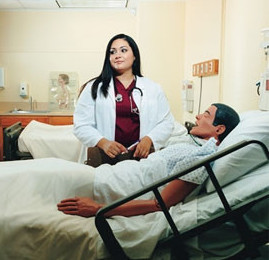There is a new nurse practitioner that was recently hired at my current site. Watching her find her place during her first year of working as a nurse practitioner, reminded me how working as a locum tenens nurse practitioner has made me a stronger health care provider.
Working in various clinical settings and with different populations, we are constantly learning something new. Something new that we can apply to our future practice. I have gained some skill sets such as doing incision and drainages, joint injections, and skin biopsies. With much experience, I have also improved my differential diagnoses, and prescribing methods. I can think outside the box and see my patient holistically.
Being one of the first nurse practitioners to work at my current site, I could see that the new nurse practitioner did not have the support system she needed, being a new grad. Sometimes she would see my patients as walk-ins. I noticed she would give solumedrol IM injection for acute pain. In another instance, she saw my patient as a hospital discharge and failed to document that a chest xray done in the hospital incidentally noted a lung mass, which needed surveillance in 6 months.
I used these examples as teachable moments. For example: avoid solumedrol unless the patient has respiratory symptoms, especially in my diabetic patients. Read hospital records thoroughly and as nurses we are usually more thorough with our documentation in comparison to our peers. And how overlooking a diagnostic finding could lead to malpractice.
I also addressed my concern with the Medical Director. Virginia is not a full practice authority state. Thus, the new NP has a supervising physician. Besides being a name on a piece of paper, I believe the new NP definitely needed closer supervision. Even as an experienced nurse practitioner, some states I travel to may require physicians to review 5% of my charts or the first few dozen notes. The Medical Director assured me that the new NP’s supervising physician will play a closer role.
Most importantly, it is important to promote an encouraging vibe in the workplace setting. Luckily, after discussing some of my patients and concerns with the new NP, she started to ask me questions she was unsure about instead of proceeding with a wrong decision. For instance, she had a diabetic patient that could not tolerate metformin due to chronic kidney disease stage 4, and was unsure if she should add glimepiride to the patient’s plane of care, whom was already on glipizide. I discussed with her that the patient should not be on both due to increased risk of hypoglycemia, but as the patient was on a low dose of glipizide, she can titrate up.
It is not our duty to judge new nurse practitioners, as we all started somewhere. Even physicians can admit their first year working in medicine is challenging. Yet, many people are still unfamiliar with the role of a nurse practitioner. Which is why I believe it is crucial we make sure we provide competent care. This can be done by trying your foot in locum tenens to make you a stronger nurse practitioner, and to make sure we continue to mentor novice NP’s.



Wow! I love that you are helping that new NP! Supporting one another is the answer to strengthening our NP roles as a whole. Thank you for your article. That’s what I want to be.. a strong NP!
Thanks! Let me know how I can help 🙂